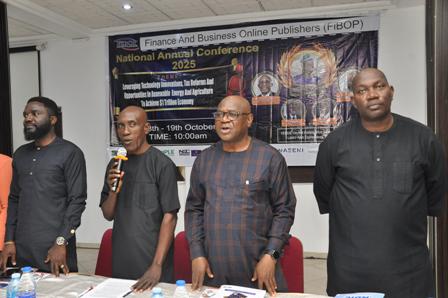
The President, Finance and Business Online Publishers(FIBOP),Mr. Charles Onwuatogwu has restated the importance of policy-oriented journalism and data-driven dialogue in shaping Nigeria’s economic future.
He said this while delivering his welcome address at FiBOP annual conference held in Lagos, with the theme, ” Leveraging Technology Innovations, Tax Reforms and Opportunities in Renewable Energy and Agriculture to Achieve $1 Trillion Economy”.
He restated the association’s commitment to convening stakeholders together to develop actionable solutions rooted in collaboration and innovation.
According to him, insurance is no longer a luxury or afterthought but a a foundational component of Nigeria’s economic infrastructure.
Onwuatogwu pointed out that as as the country pursues its ambitious goal of becoming a $1 trillion economy by 2030, the role of insurance must evolve from a passive financial instrument to an active enabler of investment, productivity, and resilience.
He stated that though the sector currently contributes less than 1 per cent to Nigeria’s GDP, it also supports virtually all other sectors such as agriculture oil and gas, construction, extractive commerce among others.
He said that the recent passage of the Nigerian Insurance Industry Reform Act (NIIRA) 2025 marks a turning point, institutionalising risk management through mandatory coverage across key sectors.
Onwuatogwu, however argued that legal reform alone cannot drive meaningful change, adding that deep-rooted barriers such as limited public awareness, cultural and religious skepticism, low trust in claims payment, and the exclusion of informal and low-income populations also continue to hinder growth.
He noted that insurance’s real impact lies in its ability to provide stability, inspire investor confidence, and accelerate recovery in the face of shocks.
The FiBOP President, said that to unlock this potential, the sector must embrace innovation, build credibility, and be intentionally integrated into national development strategies.
Insurers, he asserted must lead the charge by developing inclusive, affordable, and accessible products that resonate with Nigeria’s informal sector and underserved populations.
Simplifying policy language, enhancing customer education, and prioritising transparency—especially in claims settlement l, he said will be essential in building public trust.
Regulators, he also said must ensure the full enforcement of NIIRA’s mandates, introduce compliance incentives, and expand oversight to ensure that compulsory insurance translates into actual coverage. Government agencies should mainstream insurance into economic planning frameworks and small business development programs, recognizing it as a critical lever for risk mitigation and national resilience.
The media and civil society, he noted have a key role to play in public sensitization, using storytelling, data, and localized content to demystify insurance and encourage uptake.
Stakeholders, he opined must adopt a coordinated, multi-sectoral approach to reposition insurance as a strategic development tool central to unlocking growth, safeguarding livelihoods, and achieving Nigeria’s long-term economic ambitions.
As








